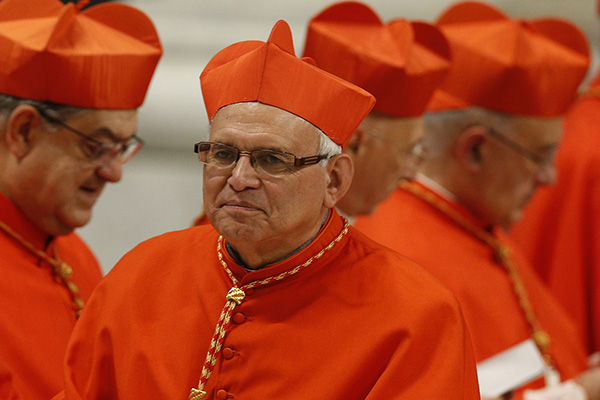
By Christopher White, National Correspondent
NEW YORK — In one of his first pastoral visits outside Guatemala since being given a red hat in October, newly minted Cardinal Alvaro Ramazzini traveled to Mississippi last weekend to stand in solidarity with Guatemalan immigrants subjected to the largest state deportation raid in U.S. history.
Nearly 700 individuals around Jackson, Mississippi were detained last August when Immigration and Customs Enforcement (ICE) officers swept through food processing plants in a surprise visit that separated many undocumented parents from their children.
On Saturday Cardinal Ramazzini told them, “You are not criminals…you are here because your own country was not able to give you what you have the right to have.”
“There’s hope that things can change,” he added.
The Guatemalan cardinal’s visit was organized by Catholic Extension, which works to support some of the nation’s poorest regions. Ramazzini’s visit and his focus on migrants and refugees further punctuates one of the issues that Pope Francis has sought to emphasize throughout his papacy.
Joe Boland, vice president of mission at Catholic Extension, told The Tablet the pastoral visit brought about moments of both pride and tears.
“Both were happening at once with all of the communities we visited,” he said, noting that there were tears from family members who remain affected by the raids, but also pride in the fact that the cardinal made it a priority to visit them.
Boland said plans for the visit began almost immediately after Cardinal Ramazzini returned home from Rome following his elevation as a cardinal two months ago.
“I am very concerned about the situation of the Guatemalan people,” the cardinal told reporters in Mississippi, saying it’s particularly incumbent upon Christians to respond to the needs of immigrants.
Those unwilling to do so, he added, should “declare themselves as atheists, unbelievers.”
“That would be more honest than saying ‘I’m a Christian’ but not being able to recognize Christ in their neighbor,” the cardinal continued.
At St. Anne’s parish in Carthage, Boland said the vast majority of the 800 parishioners work in a chicken processing plant that was raided. Many have loved ones still being detained.
As Cardinal Ramazzini made his way through the various parishes in Jackson, Boland said he was greeted with Guatemalan flags, young families, and homemade tamales to give him some sustenance for his whirlwind visit.
Father Roberto Mena of St. Michael’s Catholic Church in Forest, Mississippi – another of Cardinal Ramazzini’s stops – told reporters that in a time of great confusion among the Guatemalan families, the cardinal was bringing them comfort.
“To be close with them in the middle of the difficult situation they have been facing, a visit from a cardinal of our country is so important for them,” he said. “A lot of them are confused. They are sad. They are mad at the situation because they don’t know exactly what is going to happen to them and their families.”
“The trauma is undoubtedly so profound,” Boland told The Tablet highlighting young children whose mothers and fathers were taken. At schools, he noted, many children are warned not to discuss the situation of their parents out of fear they may suffer additional backlash and bigotry.
Facing such need, Catholic Extension used the visit to launch a mental health initiative in conjunction with the Miami-based Southeast Pastoral Institute (SEPI) to respond to the psychological needs of families that have experienced separation.
Throughout the day, Cardinal Ramazzini repeatedly turned to the issue of justice, highlighting the fact that it’s possible to enforce the law yet violate principles of justice while doing so.
“Children understand the justice issue intuitively,” Boland said. “I believe this is a moment where the children are showing us the way,” adding it’s providential the cardinal’s visit took place just before the start of the Christmas season.
“The Christmas story is centered around a child,” he told The Tablet, adding that the spotlight on Guatemalan immigrants illustrates “what that first Christmas was all about – one of housing, security, and family.”
